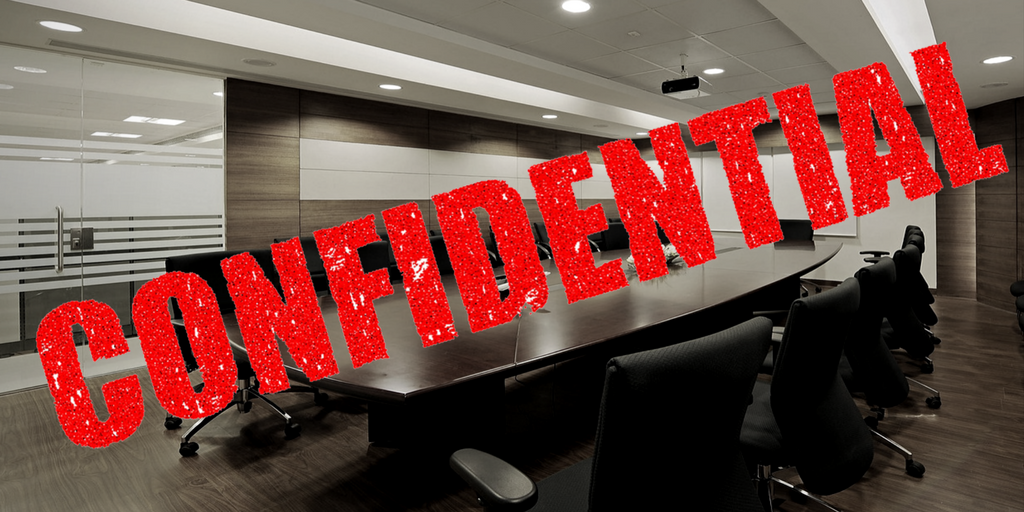On August 17, 2017, New York State Commissioner of Education Mary Ellen Elia removed Buffalo City School Board Member Carl Paladino. Elia based her decision on Paladino’s public disclosure of confidential information discussed in executive session of a school board meeting.
Removal of a school board member is relatively rare. So this should serve as a reminder that executive session information must remain confidential.
What is an Executive Session?
An executive session is a portion of a board meeting that is not open to the public. School boards, and other public boards, can only enter executive sessions for specific purposes.
The following are the permissible subjects for executive sessions of public board meetings in New York:
- matters which will imperil the public safety if disclosed;
- any matter which may disclose the identity of a law enforcement agent or informer;
- information relating to current or future investigation or prosecution of a criminal offense which would imperil effective law enforcement if disclosed;
- discussions regarding proposed, pending or current litigation;
- collective negotiations pursuant to article fourteen of the civil service law;
- the medical, financial, credit or employment history of a particular person or corporation, or matters leading to the appointment, employment, promotion, demotion, discipline, suspension, dismissal or removal of a particular person or corporation;
- the preparation, grading or administration of examinations; and
- the proposed acquisition, sale or lease of real property or the proposed acquisition of securities, or sale or exchange of securities held by such public body, but only when publicity would substantially affect the value thereof.
These subjects all generally relate to confidential matters, therefore justifying their exclusion from public consumption.
Legal Standards
Per the New York General Municipal Law: “No municipal officer or employee shall . . . disclose confidential information acquired by him in the course of his official duties or use such information to further his personal interests.”
New York’s Education Law permits the Commissioner to remove a school official for any “wilful violation or neglect of duty.”
Paladino’s Improper Disclosure
The Buffalo Board of Education filed a petition seeking Paladino’s removal for disclosing information discussed in several executive sessions. Specifically, the Board alleged that Paladino disclosed information about pending litigation, a personnel matter, and matters pertaining to collective bargaining negotiations.
Commissioner Elia did not find Paladino at fault for dislosures about pending litigation or the specified personnel matter. However, she did find that he improperly disclosed information about collective bargaining in a January 5, 2017 Artvoice article.
The Buffalo School Board discussed contract negotiations with the Buffalo Teachers Federation (BTF) in an executive session in October 2016. The discussions apparently included advice from the school district’s legal counsel.
Paladino evidently wrote about this executive session at length in his January Artvoice article. He wrote, in part, as quoted in the Commissioner’s decision:
“In an executive session on the Wednesday before [the president of the BTF’s] scheduled meeting, [counsel] brought the Board up to date on what terms had been agreed to. [The superintendent] said he needed authority for more money from the reserves. He said he needed another $10 million and he was certain he could get the return of the management prerogatives and even end lifetime health care for new hires, but he had to put the money on the table to avoid a disastrous strike.”
Commissioner Elia noted that these disclosures “revealed potential vulnerability on the part of the superintendent.” She emphasized that “the president of the BTF testified that respondent’s disclosures were a boon to him and the BTF because they showed that the district would easily acquiesce during contract negotiations in response to pressure.”
The Commissioner denied Paladino’s various defenses, including his request for a certificate of good faith. With the certificate, Paladino could have required the School District to reimburse his legal fees.
Paladino’s attorneys promptly announced that Paladino would appeal the decision.
The full decision by Commissioner Elia is available here.
You may also be interested in my post on the disciplinary process for tenured school teachers in New York State.

